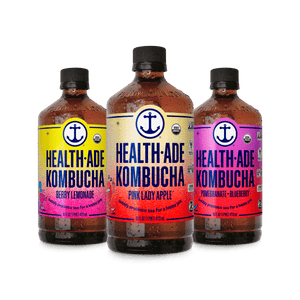
Kombucha | 12 Pack
Fan Favorite Variety Pack
One-time Purchase
49.95
Citrusy, herbal, and a little tropical, this mocktail is as refreshing as it looks. Fresh tangeri...
Read moreLet’s take a closer look at what the microbiome is, what factors influence the health of your mic...
Read moreHello refreshing! This mocktail brings together muddled blueberries, fresh thyme, lemon, and of c...
Read moreWellness trends come and go, but your gut is with you for life! Cheers to a year of skipping the ...
Read moreA bright, herb-forward mocktail with a refreshing kick, the Mint Tea Bucha Buck blends chilled mi...
Read moreThis bright, bubbly punch blends citrusy orange juice, tart cranberry, and Health-Ade Pomegranate...
Read moreIn this blog, we’re tackling some of the most common questions we get about supporting your gut t...
Read moreThis Apple Cider Refresher is autumn in a glass! Fresh apple cider and Pink Lady Apple Kombucha c...
Read moreWith busy holiday schedules, festive meals, and disrupted routines right around the corner, we’re...
Read moreThis one’s a little unexpected… but trust us, it works. The creamy richness of milk meets the bol...
Read moreMeet your new favorite holiday pick-me-up! The Gingerbread Matcha is a festive fusion of earthy m...
Read moreSure, the weather’s cooling down but that doesn’t mean we can’t keep the tropical vibes going! Th...
Read moreSupporting your gut health isn’t about being “perfect”—it’s about being consistent, adding variet...
Read moreFall in a can? You bet. The Cinnamon Apple Mocktail brings all the cozy, autumn vibes with a cris...
Read moreA tropical refresher with a gut-healthy twist! Bright pineapple, fresh mint, and a splash of lime...
Read moreSip your zen. Smooth matcha blends with fizzy SunSip Cream Soda for a refreshing, gut-friendly bo...
Read moreThis creamy, citrus-packed mocktail blends Health-Ade Citrus Immune Boost Kombucha with fresh ora...
Read moreCurious about kombucha vs prebiotic soda? Learn how they differ in gut health benefits, taste, an...
Read moreThis bright, deliciously bubbly refresher combines Berry Lemonade Health-Ade Kombucha with hydrat...
Read moreIt’s easy to fall into an eating pattern that prioritizes convenience over nutrition post-summer....
Read moreThis fruity, fizzy better-for-you sangria blends Health-Ade Pomegranate Blueberry Kombucha with f...
Read moreFeeling bloated is never fun. If you’ve ever experienced that awkward combo of fullness and puffe...
Read moreBeat the heat with a creamy-meets-zesty frozen treat. Our Orange Creamsicle Kombucha Popsicles bl...
Read moreSummer can be the perfect time to refresh your routine and focus on small, gut-friendly changes t...
Read moreSweet, creamy, and packed with nostalgic summer vibes, this better-for-you float combo stars our ...
Read moreHere are some easy (and delicious) ways to care for your gut health when you’re on the go this sp...
Read moreBursting with juicy raspberry, tart lemon, and minty fresh vibes, this better-for-you Spritz star...
Read moreIn this blog, we’ll explore some simple (and fun!) ways to make small changes that support a heal...
Read moreHappy hour? More like Golden Hour with this bright, gut-healthy spin on a blended margarita! With...
Read moreIn this blog, we’ll be focusing on healthier habits, nutrition education, and informed food choic...
Read moreWhen you’re craving a fun and comforting meal, there’s really nothing quite like a classic diner ...
Read moreFrom better-for-you beverages like kombucha and prebiotic sodas like SunSip to simple wellness pr...
Read moreWith the abundance of festive meals, sweet treats, and social gatherings this time of year, it ca...
Read moreThe final two months of the year tend to fly by in a blur of delicious food, festive traditions, ...
Read moreSip, relax, and let the tropical flavors of this mocktail transport you to sunnier shores this ho...
Read moreCraving a fun mocktail with a holiday twist? We’ve got you covered! Say hello to our Ginger Spice...
Read moreSpooky season is officially here with its cooler temperatures, colorful leaves, and the chance to...
Read moreCraving something deliciously sweet, fizzy, and fun? Well, we've got just the thing for you! Here...
Read moreSeptember is here, and with it comes the swap from swimsuits to textbooks and beach bags to backp...
Read moreCraving a Cosmo? Well sip on this delightfully gut-friendly Pink Lady Apple Cider Cosmo Mocktail....
Read moreIn honor of the newest flavor addition to our lineup of better-for-you-sodas, we’re here with som...
Read moreSo in this blog, we’re taking an educational deep dive into sugar without a side of fear or shame...
Read moreSummer is officially here and so is your new bubbly bestie, SunSip! Whether your plans include tr...
Read moreIndulge in a refreshing and gut-healthy twist on a classic root beer float featuring creamy cocon...
Read moreExperience a bubbly, nostalgic treat with our Orange Creamsicle Kombucha float, where creamy vani...
Read moreHave you ever felt “butterflies” in your stomach or had a “gut-wrenching” experience? We use the...
Read moreSpring is so much more than just the transition from cold and dark days to warmer, brighter ones....
Read moreA non-alcoholic take on a frothy, fruity, and all around taste-bud tingling happy hour treat.
Read moreWhether you’re sober-curious, looking for gut-friendly beverages, or channeling your inner child ...
Read moreI know I wasn’t the only one relived to learn that the groundhog did not see his shadow last mon...
Read more